/ Topic > Re: The Problem with Mark / Date > 22 April 1998 / Newsgroup > alt.christnet, talk.religion.misc /
.
] Douglas MacGowan wrote: Scholars agree that Mark is the oldest of the 4 Gospels. They also agree
] that the original document ended with 16:8, the women fleeing from the empty tomb. The sections
] of 16:9 forward all were added later, some scholars believe as much as 50 years later.
.
> Danny Binion replied: <snip>
.
textman answers: Dear Danny, your 'problem' is actually a non-problem since Mark does not neglect to mention the resurrection. As to the abrupt ending of the first (and still greatest) gospel; this has puzzled scholars for quite some time, and various 'solutions' have been forwarded ... None of which are entirely convincing. My guess is that one of the two following answers is probably correct:
.
1. The gospel ends with 16:8; and if we don't like it, well that's our problem, not Mark's! . . . or . . .
.
2. The gospel was originally longer, having a more extended ending, but that these final pages were somehow lost prior to the copying and distribution of the book. Now this proposal is not nearly as absurd as many people assume. You must remember that 2000 years ago, writing, editing, and publishing any book was a long, tedious, and very drawn out process. The author of Mark could very easily have died prior to the first copy being made, and that would have made replacing the lost ending impossible. Therefore, the earliest versions carried the abrupt ending, and only later did the church decide that this would not do.
![]()
ON COMMENTARIES & EMPTINESS
In speaking to the matter of the unacceptable abrupt-ending of Mark's Gospel, Keenan observes an important general feature of biblical commentaries: "Indeed, as the text reads, the last chapter has not been written. It remains to be filled in by subsequent readers. A commentary is then a filling in of the empty spaces left by the text" (Keenan, 'The Gospel of Mark: A Mahayana Reading', p.27). Now this is certainly the main reason for commentaries, but some commentaries are far too selective about which empty spaces to fill. Going to extremes, they end up with just as many (or more) empty spaces as those in the text. Some commentaries we have seen do not even bother to include the passages under discussion! In our view, any commentary that does not have the text in hand is like an ice-cream cone without the ice-cream.Of course, every commentary is necessarily limited by the paper-book format, and so will have empty spaces in any case. On the other hand, many scholars have shown that a thousand pages of commentary can easily spring forth from even one verse. But in the end, even heroic efforts to banish all emptiness will fail. A good example of this is the strange fate suffered by the Song of Songs in the history of biblical interpretation. Far too much emptiness there! Why? The scarlett thread of sexuality runs all the way through the eight chapters of Song, and this may well explain why it, and other like passages, should suffer the same unfortunate fate of scholarly obscurity.
One book in particular symbolizes and represents the attitudes and achievements of modern biblical scholarship in its treatment of these sexy-bits of Scripture. It is called 'Revelation of God' (by Knight and Golka), and though one would never guess it from the title, the book is actually two commentaries: one on the Song of Songs, and one on the book of Jonah. Moreover, there is something rather ironic in bringing together in one book the steamy sexuality of Songs, and the vastly amusing comedy of Jonah's prophetic adventures. The bad news is that the text of these books is nowhere to be found! Should we now suppose that in a book that aspires to be an international theological commentary on 'The Greatest Song', it is only good policy to dispense with the text itself, and to simply skip over those verses that 'speak for themselves'?
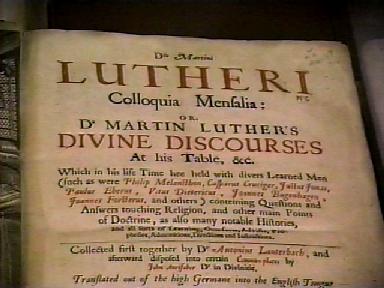
/ Re: The most important message of all! / Newsgroup > alt.religion.apologetics /
.
> CATHY921 wrote: It is given in the Holy Bible -- first and foremost!
.
On 25Sept02 textman sayeth:
.
"Yet let no one contend, and let none accuse, for with you is my contention, O priest. You shall stumble by day, the prophet also shall stumble with you by night; and I will destroy your mother. My people are destroyed for lack of knowledge; because you have rejected knowledge, I reject you from being a priest to me. And since you have forgotten the law of your God, I also will forget your children. The more they increased, the more they sinned against me; I will change their glory into shame. They feed on the sin of my people; they are greedy for their iniquity." -- Hosea 4:4-8 / RSV
ELISHA AND THE SHE-BEARS
/ Newsgroup > alt.religion.christian.biblestudy / Date > 9 July 1998 /
.
"He went up from there to Bethel; and while he was going up on the way, some small boys came out of the city and jeered at him, saying, "Go up, you baldhead! Go up, you baldhead!" And he turned around, and when he saw them, he cursed them in the name of the LORD. And two she-bears came out of the woods and tore forty-two of the children to pieces. From there he went on to Mount Carmel, and thence he returned to Samaria" (2Kings 2:23-25).
.
Now this brief passage is taken by some silly people to be a kind of parable illustrating God's attitude toward those who resort to name-calling. In other words, the crime that is the point of the parable is the crime of name-calling. Thus the moral of the story is that good Christians do not call other people bad names. But, in fact, this interpretation is just as wrong as supposing that these verses are a factual account of actual historical events. So once we eliminate the obvious, what remains? ...
.
In the NAB this brief pericope is entitled 'The Prophet's Curse', and is accompanied by an interesting footnote: "This story, like the one about Elijah and the captains, is preserved for us in Scripture to convey a popular understanding of the dignity of the prophet. Told in popular vein, it becomes a caricature, in which neither Elisha nor the bears behave in character ...". Here we find all the essential elements required for a proper understanding of this violent (and incredibly unsmurfy) pericope. First is the frank recognition that this is story; specifically, a very short story with one sharp and barbed point ...
.
And that point is that pissing on the Lord's prophet is a crime that is in every way the equivalent of disrespecting the Almighty Creator directly. Such childish arrogance and stupidity surely merits a severe response, as justice requires; and in this case we see illustrated in graphic and bloody detail the extreme measure of prophetic justice. Or as the Book elsewhere puts it: "The wages of sin is death!"
.
The second, and perhaps even more important point, is that the words of the prophet are very unlike the words of any other. We are not given the details of what the prophet said, but we are given to see the result. Thus the words of the prophet are, to say the least, potent to the max!
/ Topic > Re: 1 Sam 15 and difficult questions / Newsgroup > alt.religion.christian.biblestudy / Date > 4 Dec 1999 /
.
> On 3Dec99 Tim Frisk wrote: <snip> 4. {Judges 14:19; 15:3-5; 16:1 NIV} These are only some of the verses
> concerning Samson that disturb me. Here is a man who is empowered by the Holy Spirit of God and only in
> the end does he use that power to enact God's judgment on the Philistines. Until then, under the influence
> of the Spirit, he kills men to pay off a bet, tortures foxes and burns fields to mete out his own vengence,
> and goes to a prostitute. Now although Spirit-filled people are not perfect, why wouldn't God remove His
> annointing (as he did with Saul) from someone as profoundly violent and gullible (and apparently immoral)
> as Samson?
.
textman say: Dear Tim, the Lord works in mysterious ways; and often in ways that go counter to the expectations of those who fancy themselves good and pious believers. Frankly, I rejoice in the fact that God could and did make use of someone like Samson. It should give us all good cause to hope that the Lord can make use of us also.
.
> 5. {Matthew 5:17; Ephesians 2:14, 15 NIV} Has the Law been abolished or not? If it has been fulfilled or
> completed in Jesus, what is the meaning of "abolished" in Ephesians 2?
.
How about: "fulfilled or completed in Jesus"?
.
> 6. (Luke 7:1-10; Matthew 8:5-13 NIV) Luke states that the centurion sent elders to bring his request to
> Jesus, while Matthew says that he presented it in person. How do we reconcile this disparity?
.
Luke is wrong. Is this a problem? It shouldn't be if we bear in mind that Luke-Acts is more 'story' than 'history' (in the technical sense of the word). Thus we do well to bear in mind that Luke is out to tell a rousing tale, not to give an accurate and objective account of actual historical events. If Christians could learn this one simple fact, then all of us would be able to read the Bible with greater understanding.
.
> 7. (Mark 1:1-3; Malachi 3:1; Isaiah 40:3) Mark's statement that this is a quote from Isaiah is not entirely true;
> the initial portion comes from Malachi. Isn't this an errant statement in scripture?
.
Of course. Is this a problem? It shouldn't be if we bear in mind that the scriptures nowhere claim to be perfect, inerrant, or infallible. It is only silly and ridiculous readers (who are unable to accept the scriptures for what they are) that must invest the Book with qualities and attributes that belong to God alone. Moreover, the fallacy of inerrancy is made plain in the mountains of utterly absurd exegesis that vomits forth from out of those who imagine that the Bible is something that fell down upon the earth from the seventh heaven, a golden nugget addressed directly to them!
![]()
Tyndale & KJV
/ Subject > Re: Thee Kinds of Bibles / Date > 23 July 1998 / Newsgroups > alt.religion.christian.biblestudy, alt.bible, alt.religion.christian, alt.christnet /
.
> Richard Weatherwax wrote: <snip> Although the translaters used Hebrew and Greek text, they
> also relied heavily on the work of William Tyndale's 1535 translation. At least one third of the King
> James Version is a direct copy of Tyndale's version. Most of the rest of the KJV is dependent upon
> Tyndale's translation, to the point that some authorities say that eighty per cent of the KJV is
> Tyndale's translation. <snip>
.
Dear Richard, BRAVO!! I was very surprised to see that someone in this thread actually knows what they're talking about. You're quite right, of course. If only more people were aware of the importance of Tyndale in the history of the Bible, maybe we wouldn't have so many Christians spouting absurd ideas about how the KJV is THE *only* Bible Christians can read!
- the one who loves William Tyndale - textman ;>
WHAT WE SHALL BE?
/ Newsgroups > alt.religion.apologetics, alt.religion.christian.biblestudy /
.
Dear Cyber-Saints, I just saw that recent John Travolta movie for the first time the other night. It's called 'Phenomenon'. So this is a very interesting film in many ways; especially (perhaps) from the viewpoint of the Christian faith. Now I don't know just how accurate the presentation is to actual history, but I gather that it is "based on" (whatever that means) real people and events. In any case, one of the things that most impressed me (as arguing for authenticity, as it were) was the way that the "born-again" Michael talks. Maybe it's just me, but surely every bible-student ought to be always on the lookout for the way that words and phrases (and language as a whole) are used; especially when talking about religious, spiritual, and/or mysterious things.
.
Consider the following scene: Towards the end of the film, Michael decides to go ahead and meet the neighbors in a public forum (so as to answer questions and alleviate fears). One guy asks how he broke the big mirror over the bar, so he borrows someone's sunglasses and proceeds to spin them around and around (without actually touching them). He explains that this is a dynamic dance of energy, a kind of cooperation (or words to that effect); and the guy asks why we can't do it also. Michael hesitates a moment, then says:
.
"Focus ... Clarity of thought".
.
Now I've been thinking hard about this answer, and it seems to me that it can hardly be improved upon. In a very real sense, 'focus' and 'clarity of thought' are the very essence of Michael's hyper-aware state-of-being. Earlier in the show, Michael argues that he represents everyone; every man and every woman. He is what each and every one of
us *potentially* are. He is what we all *could* be. In that sense he is very like unto the Lord; calling us out of the depths of sin and alienation to a reborn spiritual existence (ie. to a higher state of being).
.
"Be sober, be watchful" [Or: "be self-controlled and sober-minded" according to the NETbible] (1Peter 4:7) is
just another way of emphasizing the pressing need for believers to practice 'focus' and 'clarity of thought'
... Think about it!
![]()
/ Topic > Re: Sola Scriptura is a false doctrine / Date > 14 July 1998 /You know who taught you and how from infancy you have known the holy writings, that are able to give you wisdom for salvation through faith in Christ Jesus. Every scripture is inspired by God and useful for teaching, for reproof, for correction, and for training in righteousness, that the person dedicated to God may be capable and equipped for every good work. -- 2Tim.3:14-17 / NETbible> Romanist wrote: <snip> Secondly, when Paul wrote this passage to Timothy, [ie. 2Timothy 3:16-17]
.
Dear Romanist, do you ever do any research before you post these articles of yours? My guess is that you don't bother, because if you did even the slightest bit of digging you would very quickly discover that the vast majority of bible scholars are quite agreed that 1&2 Timothy is to be classified as pauline literature. In other words Paul himself is NOT the author. Now I would be much more inclined to take you more seriously if you didn't make these childish and unnecessary errors. Please give these details more thought prior to posting as there are no 'little mistakes' in biblical scholarship.
.
> the New Testament had not been completed yet. So when he refers to the Scriptures
> Timothy knew as a child, he is refering to the Old Testament.
.
That's right. The early Greek churches had a profound respect for the Hebrew scriptures. Whatever happened to that, Romanist? Did the Catholic Church somehow outgrow the need for the OT? There is certainly very little respect for the OT in the churches today!
.
> So if this verse is settings limits on authority
.
The text in no way sets limits on the authority of scripture, so why ever should you think that it does?
.
> then it rules out not only Tradition but the New Testament as well.
.
It does no such thing, of course!
.
> <snip> In summary, the Scriptures are *helpful* in this process of equipping,
> but they are not the only source.
.
That's right. Without the Spirit of Truth within us we cannot even rightly understand the things scripture teaches us. In the same way, without the grace and providence of God to guide us, we are unable to make any progress in the spiritual life. Discipleship demands effort, and a willingness to humble ourselves before the Word of God.
![]()
/ Topic > Re: The Greatest Among You Shall Be Your Servant / Ng > alt.religion.christian.roman-catholic / 25July98 /
.
> Darryl Parker wrote: (Mat 23:1-12) <snip> (Mark 9:33-37)
> And they came to Capernaum; and when He was in the house <snip>
.
Check it out, cyber-saints -> For a short time Jesus actually owned a house in Capernaum! How come we never hear about this all-too human and historical fact about Jesus, eh? Could it be that Jesus is demeaned and belittled by the fact that he was a successful carpenter businessman, a good provider for his large family, and an independent homeowner and law-abiding (and tax-paying) citizen? ...
.
According to the long and much esteemed traditions of all the churches, yes, he is! In other words, Jesus is allowed to be a distant and glorious object of worship, but he must never ever be seen to be a real-live actual MAN living a real-live actual human life!!!
.
> (Luke 9:46-48) <snip> (Mat 18:1-6) <snip> (Luke 22:24-27) <snip> (John 13:3-17) <snip>
.
Dear Darryl, great list of Bible quotes there! Good theme. Good quotes too. ... Ummm ... Didn't you forget something? Where's the commentary? Without SOME commentary it is difficult to tell whether you are using these snippets to support me or attack me ... or are referring to something else entirely. ... Just what are you referring
to anyway, Darryl? Please DO fill us in next time you get the urge to subject us to 'A THEMATIC LIST'!
![]()
/ Topic > Re: Challenge for fundamentalist / NG > alt.religion.christian.biblestudy / Date > 3 Oct 1999 /
.
> On 20Sept99 mike_shr wrote: <snipmuch> You didn't provided any answers to the tricky questions i
> addressed in my previous posting. Read my posting again and try to focus on the questions ... or
> perhaps you should start with some easier Bible errors. Here are some for you: <snip nonsense>
.
Since the fundies didn't seem much inclined to answer mike's challenge (ie. thinking is such a terrible *bother* for them), I thought I'd throw in my two cents worth. ... Hi Mike!
.
> The earth does (Eccl.1:4), does not (2Peter 3:10) abideth forever;
.
textman answers: the prophet Peter2 is correct: The earth does NOT abideth forever.
.
> If Jesus bears witness of himself his witness is true (John 8:14), is not true (John 5:31); <snip>
.
The Lord's witness is, of course, true.
.
> Jesus led Peter, James, and John up a high mountain after six (Matt. 17:1, Mark 9:2), eight (Luke 9:28)
> days; <snip>
.
Luke is wrong. And furthermore, he is always wrong whenever, wherever, or however he contradicts the accounts of Paul and the other three earlier gospels. That is, Lk-Acts is an early second century book; it is a THEOLOGICAL "history" of the early heroic days of the Faith. It is most certainly NOT a complete and accurate SCIENTIFIC history! ...
And those who read it as such ought to be thoroughly caned ... TWICE!
.
As to your many problems with the Resurrection accounts: these inconsistencies do not trouble me as they do the silly ones who yowl about the Bible being "inerrant and infallible". I take the Bible as the Word of God, AND for what it really and actually is. Thus I give greater authority to Mark and Peter's account of these matters, and would say that the real and true historical events that actually occurred lie behind and beneath the details of their account. The other conflicting accounts require a separate explanation; each according to its own merits and character.
.
Hey Mikey, is there anything else I can assist you with?
/ Re: Church as Pillar and foundation of truth, again / Ng: alt.religion.christian.roman-catholic / 10July98 /
.
> john doe wrote: 1 Timothy 3:15 <snip> Some Catholics are quite fond of emphasizing this scripture
> when they try to defend the beliefs of the Catholic faith because to them it makes the Roman Catholic
> Church the ultimate authority of the Bible. The word "church" is interpreted by some as the Roman
> Catholic Church which can trace its origins back very far, but many Catholics forget that the church is
> "God's household" and is "his body" (Eph 5:23). They also forget that all christians (both Catholic and
> Protestant) are "sons of God" (Gal 3:26) and therefore part of God's household which is the church.
> The body of Christ is the church (Eph 5:23). Try reading what Paul says in 1 Corinthians 12:27 & Eph 5:30.
.
Dear john, actually Paul did not write Ephesians. Most scholars today consider it to be post-Paul, but obviously of the pauline school of thought. In any case, your arguments remain valid and undeniable. It is quite obvious to me, though not to Catholics, that the Catholic interpretation of scripture runs on the principle that everything must either support or defend the vastly superior Romish Church, and if it seems not to, then that's because it only *appears* not to be in harmony with the priestly vision of all things. In fact, so they believe, the Bible is not a book for all Christians, but is a Catholic book, and any non-Catholic who dares read it, clearly reads it wrongly and knows nothing about what the Book *really* says!
.
> It is interesting to note how christians are referred to as sons of God, and children of God (see
> 1John 3:1). Also look at 1John 2:20-21, 27. It is not unreasonable to assume that all christians,
> being sons and children of God, are part of God's household, the church, which is the body of
> christ. -- John Doe
.
Yes, that would be the reasonable thing to assume all right. But then if Catholics accepted this "protest-ant" interpretation, how could they possibly justify their monumental vanity and arrogance?!
.
> "But in your hearts set apart Christ as Lord.
.
There are 'outstanding' Christians ministering and pastoring to the People of God today who do indeed set Christ apart. They set him well apart from their hearts, for they have already filled their twisted hearts with other things, and their faith in him runs second fiddle to their corrupt faith in their own perversion and madness.
.
> Always be prepared to give an answer to everyone who asks you to give the reason for
> the hope that you have.
.
Lesbian-christians would much rather hide in the darkness and pretend not to exist, than to step forth into the light where all may see them and ask them about the things they live for!
.
> But do this with gentleness and respect. - 1 Peter 3:15
.
No, I'm afraid the Scripture is wrong on this point. Respect must be earned or it is worthless! If you give it away like candy at the county fair you cheapen it such that it loses all value. ... And gentleness? No again, I fear. For there are monsters in this Church who spread poison and death everywhere, and hitting them with soft and fuzzy feathers will not even get their attention, let alone convince them to stop. No. The Church of Canada requires radical-treatment at this late stage. The patient is dying on the table, and the doctors (ie. the priests) concern themselves only with assuring the poor victim that he's fine, just fine, don't you worry your little ol head about any ol thing ...
CONSTANTINE'S BIBLE?
Thus the Apostolic Age (from c.50 to c.150CE) was the Church's first - and most important - century, and the period in which all the writings of the New Testament were first composed; although they were still far from their fourth-century canonical forms as they were finally crystalized - by order of the Emperor - in the great canonical codices so important for textual criticism. In other words, although we can speak of the Christian scriptures in the churches' first three centuries, the NT as a clearly defined body of 'just so' documents (accepted by all the local "universal" churches) first appears only with the fifty 'cathedral bibles' that accompanied the early councils and the royal construction of public worship- buildings. It would seem then, that the formation of the NT owes as much to its 'creator' Constantine, as it does to its legion of apostolic authors and redactors!
ON CHRISTIAN SERVICE
The reason why Luke wishes to make a distinction between 'diakonos' and 'diakonia' is that the latter is much larger and more general than the former; it's a slave-like service that is characteristic of Christian ministry in general during the Apostolic Age. The term is firmly rooted in Israel's prophetic tradition, and the abundant slave-language of the LXX. In Jesus Christ the secular and prophetic meanings of 'diakonia' are fused into a dynamic engine driven by love and compassion. It is no surprise, then, that the service-theology of Christian ministry can be traced right through the early Christian literature: Paul, Gospels, Didache, Ignatius, Polycarp, Pastorals, etc. Luke is doubly interested in this tradition because Luke's vision of Jesus easily elevates him into the ranks of the great Lords of Compassion (ie. with Krishna and Buddha). It is interesting to note also, that a major change comes over the Church just at the end of the Apostolic Age (2C); it is the cutoff point in various ways, the end of the age of innocence. The bulk of the NT is already on papyrus, and the process of formation leading to canonization kicks into high gear with Marcion (who leads the Church into her second great schism). The Christian prophets of Egypt saved the Faith from the Gnostic threat, but thereafter the servant-slave view of ministry is quietly and quickly dropped in favor of the authority driven three-tiered model of ordained ministry that has served the priestcraft churches ever since.
IMPROVING ON PERFECTION?
St Jerome's Vulgate translation (5th cent) was used by the Western (Latin) Church for well over a thousand years, and was often praised and admired. Some, in their zeal, even declared it inspired unto perfection, such that it would doubtless last forever. But soon the Reformation and the Enlightenment changed all that; such that today the Roman Catholic Church of Canada uses another translation - new and improved, as it were - namely, the New Revised Standard Version. Now this verson itself has centuries of (Protestant) history and tradition behind it, with roots stretching back even to the sixteenth century. Sound scholarship, good prose and poetry style, inclusive language, reasonable price, etc. all make it an ideal choice for use by the modern Catholic Church. This use - in praise and worship - fills the Word and the assembly with a new spirit and power (not entirely different from the old spirit and power), thus bringing new riches out of the old "perfect" Book.
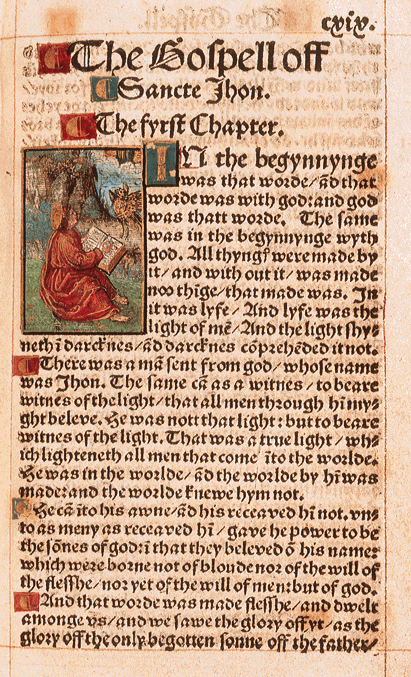
THE BIBLE IS NOT ONE, BUT MANY.
Now 'The Bible' is NOT an absolute entity after the manner of an eternal Platonic Idea. Rather, it is universal as concept, name, and symbol; although the concrete and individual (printed) Bibles will vary somewhat from one version (or edition) to the next. This brings us to an important question: Is there only one Bible; a kind of heavenly blueprint for all particular (earthly) manifestations? Or are there simply many different kinds of Bibles (getting by without an original/eternal blueprint)? Actually, these are not difficult questions. Indeed there are many types of Bibles, and many more readings of them. Different readings by different people produce different understandings and conclusions and results (especially if they are not all using the same text). These readings and results also change and develop over time such that a post-modern 21st-century believer simply *cannot* read the text in the same way that a first-century person could. The clash between theology and history, or even theology and biology, is very like this (ie. a conflict of understanding).
ATONEMENT TRADITIONS.
Four broad traditions of importance merge together in various ways throughout the many holy books produced in and around Palestine after the third century BCE. This dialectical process of mutual enrichment was even stronger under the Roman Empire, and its results can be found easily in the New Testament. The main streams can be grouped as follows:
1. the prophetic tradition -> Books of Isaiah and Jeremiah (also see Jonah, Psalms, Wisdom, Maccabees, etc). Servant of Yahweh and the 'Righteous One' - favored by Jesus; and provided the content for the reinterpretation of John the Baptist (eg. gospels), and the so-called 'messianic hope'.
2. the priestly tradition -> Paul, Hebrews, Gospel of John, Revelation, etc. Cultic terminology and concepts and symbolism. Blood of the New Covenant, Lamb of God, etc.
3. the apocalyptic/eschatological tradition -> Henoch, Daniel, Mark 13, Son of Man, Parousia, Essenes, etc. This multi-faceted mix of sundry traditions fostered dualism, martyrdom, various bloody conflicts, and an expectation of a victorious conquering Messiah/King. Despite some excesses it saw (and participated in) the coming of a new age of the Spirit.
4. the general Graeco-Roman worldview -> Pluralism, universalism, spiritual ethics, etc. Vicarious atoning death and exaltation, and also the themes of ignorance and history (as in Luke-Acts). Also see LXX!
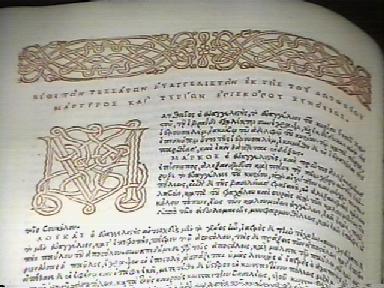
3 TOOLS for BIBLE STUDENTS.
Three things above all are required by the preacher, teacher, and student of Scripture: (1) A faith in Christ and Church that is firm enough not to be shaken overmuch by the more extreme demands that reason makes. (2) A basic - but positive - skepticism which must extend even to our favorite version of the Bible; this is because all current versions are the result of modern biblical scholarship. [Thus all footnotes, definitions, dates, cross-references, etc., that your copy may provide ought not to be 'taken on faith', rather, all such secondary information should be checked and double-checked to determine if there is some basis for credibility.] (3) A synthetic imagination that can reconcile (or at least hold together) the past and present, the social and personal, the mundane and spiritual aspects of the Bible and its scholarly literature. [This includes a basic attitude toward the Bible and its scholars that is not threatened by contradictions, nor angered by seemingly insurmountable problems, nor dismayed by obstacles (such as the diverse set of unique methodologies), etc.] Faith, skepticism, and imagination are thus the three main muscles that every Christian must develop in order to handle the Good Book with competence and confidence. And even then there is no hope of ever exhausting the richness and meaning to be found within the Word of God!
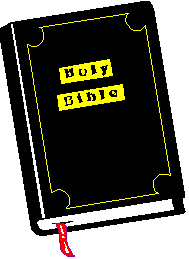
THE CHALLENGE OF SCRIPTURE.
The process of 'rationalization' (cf. Max Weber) can be said to have begun about five million years ago. Before the human race was even born, our remote ancestors (short, clever, and nasty) began the use and long development of stone tools and weapons. When some cultures discarded such things, rationalization continued, and continued to accelerate until today; where it has born fruit in biblical studies with a dazzling array of specialized methods and areas of study, and various more or less scientific approaches to exegesis, commentary, proclamation, and so on. The abundance of books in the field of biblical studies, and the bewildering diversity of opinions among those who write them (both are products of rationalization) leaves the modern Scripture reader with a very serious problem: how to bridge the gap between past and present, and the bigger gap between the 'objective' reconstruction of the original meaning of a text, and its personal and spiritual significance for us? For the Church, there is but one right way of reading Scripture (ie. within the liturgy); but for the individual Bible student (presbyter and lay are in the same boat here) there are a multitude of different ways of reading and handling Scripture, and no one of these can dare claim to be the best or only way. For those concerned with the Bible, all this adds up to only one thing: TROUBLE with a capital 'T'. It is no wonder, then, that skepticism, rejection, and even anger, are the most common responses to the secondary literature; and even the recognized classics (eg. Barth's 'Commentary on Romans') are routinely ignored or greeted with apathy. While reading the Bible is certainly no easy thing today, there is really no excuse for anger and despair; these negative vibes are not caused by the imposing complexity of biblical studies, but rather by the individual's response to this daunting challenge.

Fret Not Yourself (Psalm 37).
Fret not yourself because of the wicked, be not envious of wrongdoers! For they will soon fade like the grass, and wither like the green herb. Trust in the LORD, & do good; so you will dwell in the land, & enjoy security. Take delight in the LORD, and he will give you the desires of your heart.
.
Commit your way to the LORD; trust in him, and he will act. He will bring forth your vindication as the light, & your right as the noonday. Be still before the LORD, and wait patiently for him; fret not yourself over those who prosper in their way, over those who carry out evil devices! Refrain from anger, and forsake wrath! Fret not yourself; it tends only to evil.
.
For the wicked shall be cut off; but those who wait for the LORD shall possess the land. Yet a little while, & the wicked will be no more; though you look well at her place, she will not be there. But the meek shall possess the land, and delight themselves in abundant prosperity.
.
The wicked plots against the righteous, and gnashes her teeth at him; but the LORD laughs at the wicked, for he sees that her day is coming. The wicked draw the sword and bend their bows, to bring down the poor and needy, to slay those who walk uprightly; their sword shall enter their own heart, and their bows shall be broken.
.
Better is a little that the righteous has than the abundance of many wicked. For the arms of the wicked shall be broken; but the LORD upholds the righteous. The LORD knows the days of the blameless, & their heritage will abide for ever; they are not put to shame in evil times, in the days of famine they have abundance. But the wicked perish; the enemies of the LORD are like the glory of the pastures, they vanish; like smoke they vanish away.
.
The wicked borrows, & cannot pay back, but the righteous is generous and gives; for those blessed by the LORD shall possess the land, but those cursed by him shall be cut off.
.
The steps of a man are from the LORD, and he establishes him in whose way he delights; though he fall, he shall not be cast headlong, for the LORD is the stay of his hand. I have been young, and now am old; yet I have not seen the righteous forsaken, or his children begging bread. He is ever giving liberally and lending, and his children become a blessing.
.
Depart from evil, and do good; so shall you abide for ever. For the LORD loves justice; he will not forsake his saints. The righteous shall be preserved for ever, but the children of the wicked shall be cut off. The righteous shall possess the land, and dwell upon it for ever.
.
The mouth of the righteous utters wisdom, & his tongue speaks justice. The law of his God is in his heart; his steps do not slip. But the wicked watches the righteous, and seeks to slay him. The LORD will not abandon him to her power, or let him be condemned when he is brought to trial. Wait for the LORD, and keep to his way, and he will exalt you to possess the land; you will look on the destruction of the wicked. I have seen a wicked one overbearing, and towering like a Cedar of Lebanon. Again I passed by & lo, she was no more; though I sought her, she could not be found.
.
Mark the blameless man, and behold the upright, for there is posterity for the man of peace. But transgressors shall be altogether destroyed; the posterity of the wicked shall be cut off. The salvation of the righteous is from the LORD; He is their refuge in the time of trouble. The LORD helps them and delivers them; He delivers them from the wicked, and saves them, because they take refuge in him.
![]()
On How To Be A True
Believer:
.
Rejoice Always!
Pray
Constantly. And in Everything give thanks.
For this is the Will
of God - in Jesus Christ - for you!
Do NOT Quench the
Spirit's
Fire! Do NOT Despise
Prophesying!
But
test Everything; And Hold Fast to the Good
And
Abstain from Every Form
of EVIL!
[1Thessalonians
5:16-22 / Prophet Version]
![]()
On Not Being Convinced By Evidence
/ Topic > Re: George Washing & God / Newsgroup > alt.bible.errancy / Date > 22 April 1998 /
.
> Farrell Till wrote: This is why rational people will demand very sound evidence to support
> claims that "God" has spoken to us through such and such people or in such and such documents.
.
Dear Mr Till, if you don't believe, then you can't see anything. And if you can't see the sense in the Bible's witness to God and Jesus, then no amount of so-called 'very sound evidence' will convince you that anyone can or should put their faith and hope in the Scriptures. I believe the Bible is the Word of God, the very Voice of our Lord, not because it is without error (it isn't) but because it is true DESPITE all the errors and inaccuracies. Think about it!
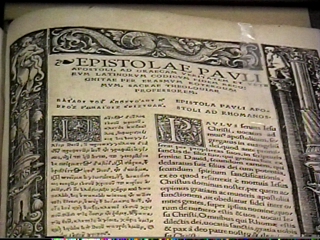
TO GNASH OR NOT TO GNASH?.
/ Newsgroup > alt.christnet.bible / Date > 1 July 1999 /
.
One day the Hellfire & Brimstone Preacher was sermonizing on the eighth chapter of the Gospel According Matthew:
.
"When Jesus heard him, he marveled, and said to those who followed him, "Truly, I say to you, not even in Israel have I found such faith. I tell you, many will come from east and west and sit at table with
Abraham, Isaac, and Jacob in the kingdom of heaven, while the sons of the kingdom will be thrown into the outer darkness; there men will weep and gnash their teeth." [Mt 8:10-12]
.
Among the congregation that day was a reprobate who just recently had his last few remaining teeth removed before they rotted away on their own. He wondered about the above verses for some time, and after the service approached the minister ...
.
toothless reprobate: "Sir, I was very impressed with your sermon today, but I was just wondering what will happen to those who have no teeth to gnash?"
.
hellfire preacher: "Sir, worry not; for teeth will surely be provided for all those who lack them."

/ Topic > Re: Authors of the Bible / Date > 26 July 1998 / Newsgroup > alt.religion.christian.biblestudy /
.
> Christopher Rothbauer wrote: Here is a list where known: <snip> Hebrews - Probably Paul / James -
> Probably James, the brother of our Lord / 1Peter - Peter / 2Peter - Peter / Jude - Probably Jude, brother of
> James and our Lord. The following are by Paul: <snip> 1Thesolonians, 2Thesolonians <snip> Hope this helps.
> -- Christopher A. Rothbauer -- Called to be a prophet of Jesus Christ in these last days.
.
Dear Christopher, actually no, it doesn't help at all! The reason why is that every one of the unsnipped items above contain errors. Thus Peter did not write 1&2Peter because he was well dead at the time they were written in his name. The same applies to James and Jude, which were written in the second century. As for Hebrews, there couldn't be a less pauline book in the entire bible! There's no way in Hades that Paul could have wrote that theological meditation. As for 1Thes and 2Thes, the fact that you misspelled Thessalonians twice clearly shows that carelessness in spelling easily translates into careless scholarship.
.
In the same way, if you were at all familiar with the secondary literature on these two books, you would know that most scholars today do not consider 2Thes to be by Paul. There are various reasons for this conclusion, which I won't burden you with (4X: very unpauline eschatology). In any case, I am not one of them (ie. I explain the discrepancies in other ways). The point of all this is that you have no right to come online pretending to know the scriptures when it is perfectly apparent that you don't! Therefore, if you wish to be a prophet, I strongly suggest you get thee hence to the little prophets college, and take a few courses in scripture so that you can at least convince others that do know something, rather than nothing ... Will you do that for me? Thx very much indeed!
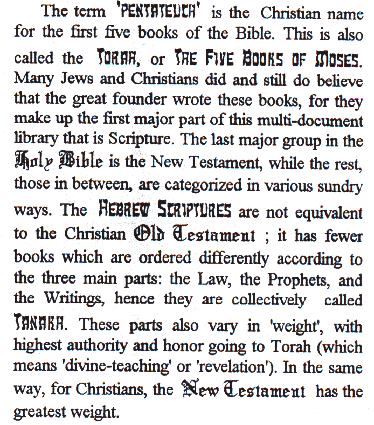
![]()
"If
any one among you thinks to be
a prophet
or a spiritual man, let him fully
know
the things I write to you; that they
are
of the Lord (and so a commandment).
But
if any one of you does not recognize
this,
he also is not recognized. So then, my
brothers
& sisters, earnestly desire to prophesy!
And
do not forbid the speaking in tongues.
But
let all things be done decently,
and
in an orderly way."
[ 1Corinthians
14:37-40 / Prophet Version ]
![]()
A Necessary Convergence.
We get a very creepy sensation deep inside our circuits whenever we are forced to say that Biblical Studies and Church history are not two separate and autonomous areas of Christian concern to be studied independently and in complete isolation from each other; but are, in fact, one and the same discipline. Of course, this was not always the case; and indeed the necessity of the covert merger has only very recently become pressing. Actually, this convergence will not take place until mid-21C; but why wait until the very last minute!
A Necessary Dependence.
John's alleged independence of the three synoptics is mostly based on the rather obvious observation that John has many unaccountable differences from the Synoptics; which differences are largely incomprehensible to a great many scholars and believers alike. Therefore', they say, 'John did not know or use them'. Historically, however, such a conclusion is all but completely impossible, and only those with no regard whatsoever for historical realities would dare to defend such a ridiculous position.
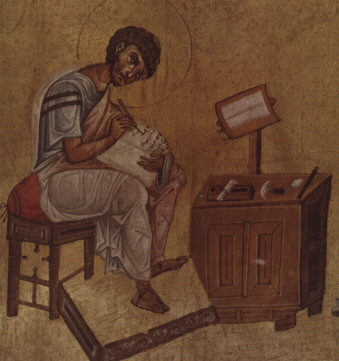
/ Re: Spirit Filled Believers. / Date > 29 Dec 1998 / Newsgroup > soc.religion.christian.bible-study /
.
] God places obstacles in our path the way
] we deal with these leads to less or more obstacles.
.
> Mary L Groff wrote: <snip>
> Suffering comes in many forms. Tests, trials, obstacles,
> sickness, persecution etc. God "allows" the enemy to work in
> our lives. Out of that, when we learn to obey Him, He destroys
> the works of the enemy in our lives. -- Mary
.
Dear Mary, it is interesting that you should mention the enemy in
this context. It is interesting because your view directly contradicts
Linda's. She claims that God places obstacles in our path, while you
say it is the enemy who does this. According to the OT, the root
of the word 'satan' means "one who opposes, obstructs, or acts as
adversary". In the same way, the Greek term 'diabolos' (which was
later translated as 'devil') literally means "one who throws something
across one's path". Nuff said.
![]()
IT'S STORY-FICTION?
Luke-Acts is neither
fiction nor history;
but because it contains
elements of both, it can only
be of that strange
genre known only as historical fiction!
![]()
The Heart
of the Matter
[Or:
More On Mark 10:5-9]
The decisive moment for the male-female dynamic came with the divine creation of human sexuality. This is the moment to which Christ is pointing: the birth of intimacy, passion and romance. Jesus can mean nothing less than all these. Only with this spiritual-physical trinity firmly in place (united and bonded in love) can we understand the full scope of the Lord's emphatic command. His final word on this vital topic is to let no one and no thing (no institution, no custom, no ideology or belief, etc) interfere or impede or hamper or frustrate the normal development of relations between the genders. This includes everything from divorce to homosexuality to various distractions and preoccupations to chastity to inhumane piety to foolish ideals to etc etc. Indeed, Christ's prohibition is so sweeping and universal in scope that it can even include someone who feels that they are perfectly justified in abstaining from all human entanglements and involvements. Even those who stubbornly refuse to take another seriously. Why so? Because all this mess basically stems from the same thing. The Lord identifies for us what this 'same thing' is: hardness of heart! ... Perhaps this authentic wisdom- saying, containing, as it does, the full force of the combined authority of Moses, Torah, and Christ, ought to be the new golden rule for these sad and confused modern times ...
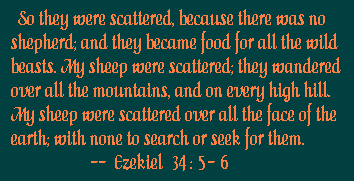

Through
the Streets of Cyber-Space
[from
Jeremiah 5:1,5; 6:13,7 / Prophet Version]
/ Forum > TheologyOnLine - Bible Study / Date > 22 Oct 2000 / Newsgroup > alt.religion.christian.biblestudy /
.
Thus sayeth the LORD:
.
"Run to and fro through the streets of Cyber-Space.
Look around and take note.
Search through its chat-rooms and newsgroups.
See if you can find even a single person
who deals honestly and seeks truth,
who does justice and seeks faithfulness.
If you can, then I will not punish these web-sites."
...
But they all alike have thrown off His authority
They have burst the bonds, and refused to be subject to Him.
...
"This is because, from the least to the greatest of them,
all of them are greedy for dishonest gain.
Teachers and prophets and priests alike; all of them practice deceit,
and every one deals falsely.
...
"As a well produces fresh water, so the Net is ever doing wicked deeds.
Sounds of violence and destruction echo throughout the World-Wide-Web.
All I see are sick and wounded people."
[with apologies to Jerry]
.
- the small one who assists the big ones - textman ;>

Growing With the Word.
Anyone who thinks that we can stop using our minds when we go to scripture simply hasn't been there. Just the reverse is true: Nothing can challenge our mental abilities as much as the Bible. Our greatest understanding is called for in finding faith; once faith is found, it joyfully and obediently seeks greater and greater understanding. Just try one of the longer letters of Paul. It'll immediately become apparent that the person we're dealing with here was an intellectual giant. And this means that the people to whom and these letters were addressed (including us) aren't expected to be intellectual pygmies, either. For anyone looking for abundant food for thought and amazing intellectual growth, the Bible is the place to go. You'll fall in love with it. It'll become 'holy' to you. Its mere beauty will no longer be enough to satisfy you; but the mental exhilaration and sheer joy in its meaning will fascinate you and abide with you forever. The Bible reaches out and grabs us with questions (and answers) we could never come up with on our own. It has 'power to make you wise' . [from 'Short Meditations' by R. L. Short, p.32]

THE CATHOLIC RESPONSE TO TEXTMAN.
"Let us lie in wait for the righteous man, because he is inconvenient to us and opposes our actions. He reproaches us for sins against the law, and accuses us of sins against our training. ... Let us see if his words are true, and let us test what will happen at the end of his life; for if the righteous man is God's son, he will help him, and will deliver him from the hand of his adversaries. Let us test him with insult and torture, that we may find out how gentle he is, and make trial of his forbearance. Let us condemn him to a shameful death, for (according to what he says) he will be protected." Thus they reasoned; but they were led astray (for their wickedness blinded them). -- Wisdom 2:12,17-21
A FORGOTTEN BEAUTY?
In the history of biblical interpretation, no book or passage has suffered from as much confusion and unbridled flights of fancy as the unfortunate Song of Songs. Indeed, the Greatest Song has been worked over and abused far more than any other text in the entire canon. It has been repeatedly assaulted and molested by hordes of scholars, sages, and theologians who are very determined NOT to listen to the text.But they certainly will go to unbelievable extremes to impose their own artificial interpretations and allegorical visions on a text that is powerless to resist their aggressive gropings and wrenchings. Indeed it has always suffered from numerous and conflicting interpretations. Warnings, prohibitions, legislations, and censorships have always governed (and still do) the public and private use and reading of this most bothersome of the Old Testament's holy books.
.
Among the scholars and commentators there is much debate about the number of songs, whether it is one long song, or thirty short ones. There is lively discussion as to their form and structure, as well as their origins and meanings. There is notable disapproval of allegorical methods, but no consensus as to whether the Song qualifies as wisdom literature or not. There is even debate about whether or not these love poems truly belong in the Bible!
.
So what can be learned from all this mass of conflicting ideas, attitudes and emotions; this abundance of hermeneutical chaos? The message and magic of the Song seems somehow to elude the methods and the keys designed to unlock the meanings and secrets that lie buried within. Besides an abundance of names (eg. Canticle of Canticles, Song of Solomon, Song of Desire, the Greatest Song, Most Misunderstood, etc. etc), has the Song generated any wisdom? Or indeed anything of lasting value to Christian faith and life? Oh, yes! Well, perhaps only a little. The main problem is that even after 25 centuries we are still waiting for an adequate translation.
.
It has also been observed by R.E.Murphy's commentary (1990) that the "Hebrew Bible thus provides a coherent framework within which one can interpret the Song as expressing a theology of human sexuality" (101). Of course, the Greatest Song expresses a lot more than that! But we would only suggest that a better framework will include the entire Holy Bible; and the Lord Jesus Christ as well.
.
As we said earlier: ... only a little ...

THE SHEPHERD'S 12 COMMANDS
/ Newsgroup > alt.christnet.christianlife / Date > 9 Sept 1999 /
.
[ The following counsels are the twelve great commandments given to
Hermas by the mysterious Shepherd. From 'The Shepherd of Hermas' ... ]1. Believe in God, and fear Him.
2. Be sincere and single-minded.
3. Love truth.
4. Keep pure.
5. Be patient and understanding.
6. Practice self-control.
7. Fear the Lord, and not the Devil.
8. Restrain oneself from adultery and all kinds of evil activity.
9. Petition the Lord without hesitation.
10. Avoid sadness.
11. Avoid false prophets.
12. Cast off all evil desires.
.
- one still working on them - textman ;>
THE VALUE OF COMMENTARIES.
If commentaries are the most important, and most popular, of all the so-called secondary literature of biblical studies (the primary literature being the sacred text itself), then book reviews are quite likely the next most important genre. Among Academia, where biblical scholarship is centered, magazines of various sorts are found in great abundance, and are in constant use by the faculty and students. If there is any one thing that all these many magazines have in common, it could only be the presence of book reviews somewhere between the covers. Articles too, but these are vastly different from one magazine to another. Book reviews, on the other hand, tend to come in one format, usually short and sweet; although they too can vary in terms of length, content, and style. But commentaries still remain by far the most popular reading material in biblical studies.
.
But did you know that the curious tendency of modern commentators to shy away from speculation (idle or otherwise) is most disconcerting in some respects (eg. it indicates constipation of the imagination). It is, again, justified by the observation that speculation (unbridled or otherwise) runs contrary to the spirit (but not the practice) of objectivity, neutrality, accuracy and exactness of detail, etc., that supposedly distinguishes the commentary genre from all other writings on or about the Bible.
.
While this observation is true in some respects, it is also a fact that most commentaries now recognize and admit that objectivity and neutrality are more something to shoot for than something that can be fully realized. This recognition is - in part - forced upon biblical studies by the current rising tide of theological and hermeneutical pluralism. This latter item is interesting chiefly for the fact that it re-admits (by the backdoor as it were) relevance, meaning, and imagination in our common wrestling with the Word. The way is now being paved for new directions in biblical studies, and many exciting ways and means are sure to emerge. The only thing likely to happen is that something unlikely will happen. These are interesting times (as the Chinese curse goes) for Christians and their strange old Book. Never has there been a better time to study the Word, and swim in its depths, and let the power and light shine forth into hearts and minds at home and abroad ...
.
But (there's always a 'but'), there is a downside too. The vast increase in resources and tools and secondary literature and other sundry 'helpful aids' is accompanied by two potent handicaps: 1) The everincreasing complexity and variety of the biblical secondary literature creates confusion and a leveling effect that threatens to dispense with reason and assured standards. 2) Almost 2000 years separates the current generation from the original writers and readers of the NT books (centuries more for the OT books). This means that we have practically lost touch with them in almost every way that matters (eg. thinking about the world, history, human nature, etc). Their world is not our world, and the differences between them vastly outweigh the similarities. In thinking and feeling and talking and living we are very different creatures; or so it seems. To read the Bible today, one must make a flying leap; the gulf to be crossed is immense, but with a little luck and grace, and a whole lot of prayer and study, why just about any obstacle can be overcome (or at least bypassed) ...

TO QUESTION EVERYTHING
And because biblical studies are so complex and diverse, nothing can be taken for granted anymore, nothing can go by unquestioned, and so everything must be analyzed, compared and tested. It is far too dangerous to simply ignore or overlook certain 'minor' details and problems; too dangerous to start from easy assumptions acting like conclusions; too dangerous to adhere to the canonical format as an infallible guideline (for the sake of comfort and simplicity). All this is too dangerous because it is methodologically risky, just as it is methodologically unsound to suppose that conformity to tradition, or the consensus, automatically overcomes this inherent problematic riskyness that lies at the very heart of modern biblical scholarship.V V'
/ Newsgroup > alt.religion.christian.roman-catholic / Date > 27 March 1999 /
.
Some say that Christians know the liturgical readings all too well; that they are thoroughly familiar with them, and do not need to be told what they mean. But knowing the words is one thing; knowing the truth behind those words is another matter altogether. The lector proclaims the Word, and so places the words in the ears of the assembly. But this is not enough. Not by a long shot! If the Word of Life and Truth does not enter the heart, how can it generate Faith and Joy? Hearing with the ears alone simply cannot save us. This is why the preacher is so important. It is his duty to make sure that the Word does not remain in the ears (where it will quickly dribble away). It is his solemn obligation to facilitate the transfer from ear to heart (where it will abide, and so enter our daily lives). Anything less than this is a failure to preach, and a betrayal of the priesthood. The current poverty of Christian preaching is evident in the vision of the homily as mere story-telling. The story-method of preaching seeks only to entertain and amuse childish minds. In this regard, it is a whopping success. But the story-homily only deflects attention away from the only story that really matters; the story of God's revelation as set forth in the Scriptures. Therefore let the homilist be a man or woman who is a truth-teller first and last, and only secondarily a story-teller ...
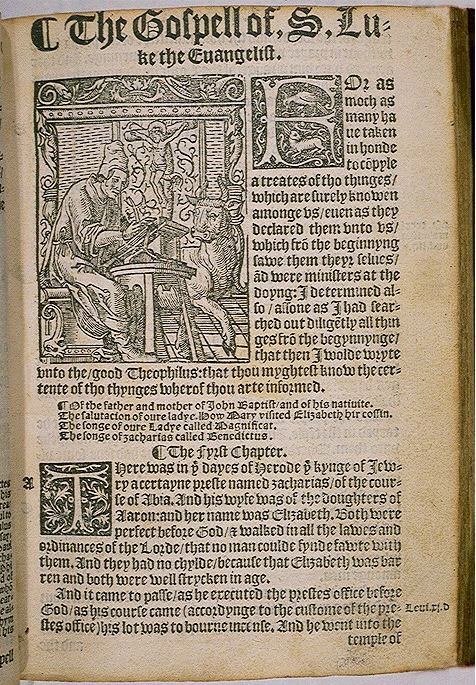
/ Re: VATICAN DECLARES SCRIPTURES DANGEROUS!! / Newsgroup > alt.religion.christian.anabaptist / Date > 10 Sept 1999 /
.
] Nicholas wrote: VATICAN CITY, Italy - The Vatican criticized a literal interpretation of the Bible and
] said the fundamentalist approach to scripture was a kind of intellectual suicide.
.
Tondaar replies: Dear Nicholas, the Catholic bishops are perfectly correct to criticize the literal interpretation of Scripture; for the simple reason that an unrelenting literal interpretation is *grossly* inadequate to the complex nature of the sacred texts. In that sense, the fundamentalist approach to scripture is indeed "a kind of intellectual suicide"!
.
> Teresita, being somewhat peeved at Nicky's silliness, responds: Oh, I get it, so the Vatican did
> not declare the scriptures dangerous, as the title of this thread proclaims, but instead declared
> that a human interpretation of the scriptures is dangerous.
.
Dear Teresita, how's that again? "a human interpretation of the scriptures is dangerous"? Where did that come from? Did you read the entire document in question? Why don't you show us all where it says that a "human interpretation of the scriptures is dangerous". I seriously doubt that you will be able to do so, as this would imply that the episcopal interpretation is something other than "human". What is it then? A divine interpretation, perhaps? Well, if that is indeed the case, then we should all rightly expect that the Magisterium's understanding of the Scriptures must always be inerrant and infallible (and that it must always have been such). But when we look at the history of the episcopal interpretation of scripture we find many erroneous views and conclusions regarding the texts and the meaning of those texts. So how do you account for this strange discrepancy, eh?
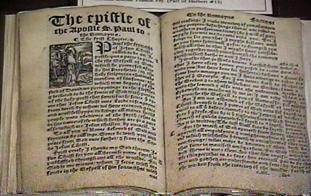
The Truth About Celibacy (Mt 19:12)
Biblical scholarship marches on; as always. This despite a whole series of handicaps due to an astonishing lack of imagination on the part of the vast majority of bible scholars. But once in a while an interesting biblical nugget is unearthed and somehow manages to shine through the confabulations, errors, and fancies of the mythical scholarly consensus. So, for example, this here book is over eleven years old, and is now on the Master of Divinity top-19 list, but the impact of one particular nugget on the Church is minimal; to say the least. Yet this is no mere scholarly opinion that can be easily disregarded as irrelevant. In fact, the authority of this exegesis far exceeds anything that the catechism may say, owing chiefly to the fact that it correctly discerns the mind of Jesus on this all important matter.
.
Indeed, I feel it ought to be apparent to one and all that the implications of all this are nothing less than revolutionary in the extreme! [For example: this pericope (and its handful of relatives) is a clear and undeniable refutation of any and all attempts to interpret the Lord so as to have him 'approve' homosexuality.] Now Matthew's creative midrash on his Markan source (cf. Mt 19:11-12) is the churches' great pro-celibacy text. But ... "This interpretation, although traditional, is hardly adequate to the text" (R.F.Collins, Christian Morality: Biblical Foundations, p.187). As a response to the disciples' claim that it is better not to marry, Jesus' answer is meant as a powerful rebuttal, and should not be seen as something that somehow 'proves' celibacy as the ideal form and mode of Christian discipleship.
.
Note carefully the way that Jesus talks: 'one-flesh' (v5); 'because your hearts were hard' (v8); 'Not everyone can accept this' (v11). [Jesus mentions the various types of eunuchs. He does not mention 'gay, lesbian, and transgender persons'; not because such creatures did not exist then (they did), but because these are obviously incapable of attaining the one-flesh; ie. 'homo-flesh' is NOT the same thing as 'one-flesh'] "When these several factors are taken into consideration and attention is paid to the content of the logion, it is clear that what Jesus is saying is that if his disciples cannot live up to the Creator-intended demands of marital fidelity then, and only then, is it better not to marry." In other words, the Lord's attitude is such as to make it quite clear that fidelity, commitment and love between husband and wife is IT! There are NO "alternatives" that may or may not be 'equally valid', let alone 'spiritually superior' . . .
On Luck and the Lord?.
/ Topic > Re: Aniti-Christ / Newsgroup > alt.bible.prophecy / Date > 6 Dec 2000 /
.
>> besq wrote: Then what was Christ when He died? Just unlucky?
.
> On Nov26 yisraelman@aol.com (7) answered: I guess unlucky since he died like all men do
.
textman replies: Dear 7, I think that was part of the point of the Incarnation. I hardly see what luck has to do with it; since Jesus went willingly and knowingly (but NOT enthusiastically) to the same fate that awaits most of the prophets. If it can be said that the Lord was sacrificed unto God (the same one who abhors human sacrifice!?), why can't it be said that the murders of the prophets are also a sacrifice unto God? Surely this idea is not totally absent from the Tanakh? ...
.
Something very like this features prominently in Isaiah *and* in the so-called 'Wisdom of Solomon'. Maybe that's why the early Christian writers were so darn fond of those particular books of holy writ, eh?
.
> If you read your New testment you would find that he didn't die and rise in 3 day and mathew,
> mark, luke, and john all give different story of his rise from the dead.
.
The reason they all give a different story is that Mk's account (the main source for the other three) is far too short (ie. perhaps the last few pages of the original autograph were lost before copies could be made). But short or not, Mark and Peter's retelling remains the best, the most authoritative, *and* the most historically reliable!
.
> The new testment writer can't get it right.
.
The New Testament *reader* can't get it right!
.
> HE WAS BORN MALE, LIVE A MALE'S LIFE, AND DIED A MALE.
.
Sure Jesus was a man, but the Incarnation is certainly not about the Lord being "A MALE", but rather about being a human being so that the Father of Lights may be revealed to *all* human creatures!
P.S. Just what in tarnation is an "Aniti-Christ" anyway?! . . .
T'aint no such word in any of *my* many copies of the scriptures!
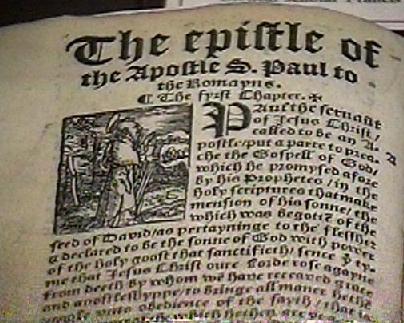
THE WAY OF BARTIMAEUS
[ A Sermon
on the Readings from the Sunday Lectionary
# 149 Thirtieth
Sunday in Ordinary Time > First Reading
from OT: Jeremiah
31:7-9; & NT: Gospel of Mark 10:46-52 ]
Now this fascinating story is unique in the New Testament, even for Mark. Here Jesus is very laid back and relaxed such that it is apparent that this is not a story about Jesus, as such. It is a story about a blind beggar; which is to say that it is a story about true discipleship. The importance of this distinction is clearly uppermost in Mark's mind; and is the main reason that Mark makes a point of naming the man. Bartimaeus is not just the name of this particular 'hero of discipleship', but is also the name of all the 'blind beggars' who follow after Jesus. It is indeed the true name of the early Greek Church; and so it is our name as well!Speaking for the Lord, Jeremiah (in the first reading) tells us that the Father of Israel will gather the remnant from the farthest parts of the earth. They will come with weeping, and he shall lead them in the straight path to the promised land. That was long ago, yet the promise remains. Today, the Lord's people are our own Canadian Christians, who indeed are spiritually blind and lame, and weeping with the pain of spiritual starvation; what Mother Teresa calls 'the hunger of the heart'. Bartimaeus shows us that the straight path is the way of Jesus of Nazareth who heals our blindness and lameness through faith in him. Thus we see correctly only when we keep our eyes firmly fixed on the One Teacher, and follow him down the straight path that brings consolations and heals our wounded hearts. If we choose not to follow the way, then we betray the promise and the call, and are plunged at once back into the darkness that tricks us into believing that we are not blind and lame, when in fact we are.
In the darkness we stumble away from the straight path, but do not notice it; for we have lost sight of the One Teacher who leads us truly and wisely to the Promised Land. In the darkness we cry out "Lord, have mercy on me!" and "Save me, Lord!"; but we do not believe it because we already know that we are saved by God's infinite compassion and boundless forgiveness. Thus we go to Church and hear the Word; we eat his Body and Blood, and then turn around and at once forget He-who-calls, because we think we know what is best for us. We place our trust in the cherished councils of our own minds, and refuse to admit the Word past our ears and on into our hearts. Thus we prove that we are unbelieving and faithless disciples. And not having faith in the Word he speaks to us, we cannot answer the call to follow, and so remain in darkness, and fancy ourselves good and holy and saved. Therefore Canadian Christians are both blind and lame; but because his name is on their lips (but not in their hearts), and because they hear the Word with their ears (but not with their hearts), they imagine themselves secure on the straight path. But the Lord is NOT deceived. He knows very well that they walk in darkness, and wander far away from the straight path in order to follow the strange and twisted paths of their own devising.
Like Bartimaeus we are all of us living in darkness and isolation; cut off from the source of Light & Life. But he at least was well aware of his condition, and so could cry out for mercy. But we are so busy wandering the strange ways of our own paths, and so sure that we are not blind and lame, that we do not even bother to beg for mercy from the only One who can save us. We do not put our faith in Him, or his Word; we put our faith in priests and bishops (thinking that they know what is best for us all!). The fruits of our self-assured and self-proclaimed salvation are that we need never follow the Narrow Way to the Land of Life & Truth. Look around you. Look at this great 'compassionate' society we have built for ourselves. Everyone is wrapped up in cloaks of Pain & Darkness. And only those who truly live the Gospel can offer them the light of healing truth by showing them the Way to the Straight Path. This is the Way of Bartimaeus.
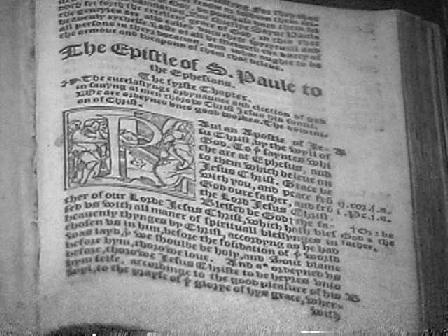
WHERE BE THE ESSENCE OF FAITH?.
/ Newsgroups > soc.religion.quaker, alt.religion.christian.biblestudy / Date > 19 Nov 1998 /
.
So FEAR the Lord (while you also LOVE the Lord with all your might)! And do not neglect to fear the Powers & Principalities that rule this World with Iron Fist & Velvet Glove. For they will also assure you of Salvation (if only you call upon the Lord loud enough), and lead you down the path of Spiritual Ruin & Desolation; while all about you seems Peace & Fun & all Good Joy-Joy Things.
.
Yes, some churches pride themselves on their leadership, and on their various forms of governance, and on their various particular traditions (of greater or lesser length; as the case may be), etc. And other churches pride themselves on not having such forms of governance and leadership; and some even on having no leadership at all (other than the Holy Spirit ... (of course)). So consider this vast array of churches stretched out over Time & Space, all Calling Upon the Lord in many and numerous ways and means, and worshiping same in sundry fashions, and all in sure possession of the Power & Authority & Righteousness of the Holy Spirit ...
.
Poor Thing! Surely She is the most abused divinity in the entire span of religious history and pre-history . . .
.
And do all these good Christians demonstrate their love for Her in any of this? Does it not rather seem as if pride were the essential substance and content of Faith? Why then is pride everywhere listed among the sins and vices? Do not all the religions and holy men throughout the ages agree that this is rightly so? ...
.
Is Faith then built upon Sin & Iniquity? Is faith thus founded upon the pride and self-idolatry of the churches? So that Many & Assorted individual Christians can assure themselves of salvation in sin, and holiness in iniquity? ... This indeed seems to be the function and reason-for-being of all the New & Improved post-modern churches; whether they be here in North America, or overseas in other Great Lands & Nations. But this soothing arrogance, and these pride-generated illusions, are NOT the foundation of Faith. And the Lord sayeth that the Rock upon which the True Believer builds his/her life is faith in the Son of Man!
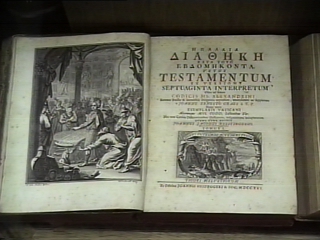
"Become
earnest about the Word! For as to the Word, its first part is
faith,
the second, love, the third, works; for from these comes life.
For
the Word is like a grain of wheat: when someone had sown it, he had
faith
in it; and when it had sprouted, he loved it because he had seen
many
grains in place of one. And when he had worked, he was saved
because
he had prepared it for food, and again he left some to sow.
So also
can you yourselves receive the kingdom of heaven; but unless
you
receive this through knowledge, you will not be able to find it."
[from The
Apocryphon of James 8:11-28]

It
Happened to Judas Too
There's an old saying that runs something like this: 'A wise man will always keep his friends close; but his enemies even closer'. I've often wondered about this idea. And wondered also how it could possibly work if consistently applied. In any case, I've come to believe that there is considerable wisdom in this universal policy. After all, The Lord of All kept Judas nearby, gave him great responsibilities, and even called him 'friend'. It's interesting (isn't it?) when you think of what has become of Judas and Peter. Everybody knows these names; and studious Christians even have some idea of who they really were, and what they did, and so on. Everyone assumes that these two represent the polar opposites along the spectrum of human faith. It is a neat and convenient idea; one that simplifies many things. Alas, the full truth is never so tidy. In Life & History, Judas and Peter were not the black and white we now take them to be. Peter, now the Great Hero of the Faith, once betrayed his Lord; a fact that is often acknowledged, but seldom respected. And Judas, now the Great Betrayer, is condemned to Eternal Darkness for the very same crime that Peter is so easily forgiven for! Yet Judas once had a faith in Jesus that none of the other disciples could hope to match. His zeal was widely recognized and respected. Yet all these mundane little historical facts we have also conveniently forgotten. Such is the wisdom of the traditional faith. All in all, I'd have to say that Judas got a rather raw deal from history. Christian Tradition continues to abuse and slander this grossly misunderstood man. A man whose remorse and sense of honor compelled him to pay the ultimate price for his self-recognized and self-acknowledged crime. How many of today's progressive and post-modern Christians have a sense of honor and shame this strong? Are they willing to pay the ultimate price for their sins and iniquities? Do they have even a fraction of his courage? Of his fine sense of right and wrong? Are they even willing to admit their crimes? Do they even have the BALLS to confess that their so-called faith is based on arrogance and vanity and NOTHING MORE?! I think not. Catholics love to pamper Peter's purified image, and extoll his exalted reputation; but where is the Christian compassion, mercy, and justice for Judas? Nowhere to be found in this corrupt and hypocritical generation ...
The Truth Not Ignored ... But Forsaken!.
So anyway .... If you believe in the Sacred Scriptures, or worse, if you have formed a deep and abiding love for the Word of God, then you have no business being a Catholic. For the Catholic Church (like the rest of Canada's post-modern and progressive Woman-Church) is characterized by a violent hatred of all biblical truth. This gross and profound disrespect for the Very Voice of our Lord takes many forms among Canadian Christians. The most popular of these (by far) is a simple (but wide-spread) ignorance. This universal lack of knowledge of the Bible's contents well suits the priestly ones (those self-appointed experts on all things religious), and is due (in large measure) to the fact that, unlike so many 'modern' books, this book actually demands that some effort be made in order to read the thing with understanding. And people simply do not want to lay out the kind of effort required; not for such uncertain and nebulous rewards as are offered by that strange and distant book.In the same way, there is no real motivation for the Christian to read the scriptures at all, since everything that is necessary to know about it is already well known to the clergy (who are made experts in Sacred Scripture by virtue of their ordination). Therefore, if you want to know what the Bible has to say about this or that particular topic, you need not bother looking into the thing yourself, but need only ask your local priest or pastor or minister. And also, for most Christians (including priests, pastors, and all manner of Church teacher and leader) the Bible is simply irrelevant to life in postmodern Canada. Thus there are many who take various courses in Scripture (mostly because they are required), and sitting there soaking up all the info, it never occurs to them that this or that particular book might actually be addressing them directly.
All that I have said so far can be well illustrated by reference to a certain individual of violent temper and unhappy disposition who (I submit) beautifully demonstrates the results and consequences of this all too common approach to the study of Scripture. So I would say that a proper study of the Bible requires a certain (shall we say?) respect for the text. In the same way, a proper study of the original Greek language of the New Testament also requires at least a modicum of respect for that good language. But this person has her own ideas about what constitutes the Koine (common) tongue. You see, she is very much into inclusive language, and consequently when she comes across a Greek phrase that reads 'He said this' or 'A man did that', she translates these as 'She said this' or 'A woman did that'; despite the rather obvious fact that ancient Greek is perfectly capable of distinguishing between male and female (and even has its own unique word for 'woman'). Thus, this lady's idea of inclusive language is to simply delete any and all references to men and all things male, and to replace them with references to women and all things female. [In this attitude we clearly see the motivating force behind the shrieking demand for inclusive language in and out of the Bible.] I would now suggest to the reader that this approach to the study of the NT language - while it may indeed be 'cute' and/or politically correct - in fact demonstrates a violent disrespect (verging on outright hatred) not only for the NT language itself, but also for the Bible in general. Moreover, this post-modern feminist attitude easily translates from the one to the other, and indeed is comprehensive enough to include all religion, all history, and indeed all human reality.
Now this is an attitude that is very much supported and encouraged by the liberal and progressive priests, teachers, and leaders of Canada's wonderful and ecumenical Woman-Church. If anything, it is even easier for the priests to despise Scripture, simply because of the 'fact' that ordination confers instant expertise and authority over the Bible. Please let me be blunt: the priest does NOT serve the scriptures (as is often claimed by various apologists). Rather, the priest is Lord & Master of the Scriptures; and God help any man who dares to question their supreme authority over that Good Book! Thus, as far as the Church is concerned, the only interpretation of the scriptures that retains any validity and/or authority (on the faith of Christians) is - of course - the priestly interpretation (which waters down the Gospel, and tickles the ears of the perverse and the wealthy). All other approaches can be left at the door if you please (for they have no value whatsoever). Thus the clergy freely and gladly distort the truth of the Word in order to bring it into conformity with their own corrupt and diseased vision of realty. Being therefore the 'Masters of All Truth' they feel themselves to be perfectly justified in imposing their own warped perceptions upon the text, and in washing out the Lord's Truth for the benefit of dissolute Canadians (who do not want a religion that demands anything more of them than the occasional monetary contribution). In the Church of Canada, salvation can indeed be bought and sold.
The priests have therefore betrayed the Faith through their self-serving corruption of the Truth of God's Word, and have sold out the Lord to the benefit of the spiritually-dead rich and powerful ones. Consequently, the teachers and leaders of the Woman-Church of Canada, when they reach into the inexhaustible riches of the Word, bring forth nothing more than the madness and illusion that they themselves have placed there. Thus in the Canadian Church pluralism and ecumenism mean never having to say 'I am committed to the Truth'. All that is required of clergy and laity alike is that they can say 'I am committed to the Church'; which means 'I am committed to the priestly perversion of the Faith, and to the priestly distortion of All Reality'. These are the logical consequences of failing to respect (and pay attention to) the Word of Life, Liberty, and Truth! Indeed, the corrupt and apathetic people of Canada have the church they deserve in 'The Church of the Poisoned Mind & Twisted Heart'.